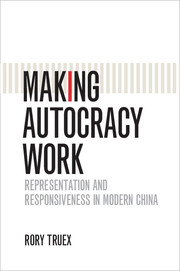Book contents
1 - Introduction
Published online by Cambridge University Press: 13 October 2016
Summary
Tone Deaf?
The nearly 3,000 deputies to China's National People's Congress (NPC) are widely dismissed as little more than cronies of the Chinese Communist Party (CCP), brought to Beijing each year to warm seats and vote through the legislative initiatives of central leadership. To date, no single bill before the full NPC plenary session in March has ever been voted down, a pattern that has earned the parliament the familiar “rubber stamp” moniker among critics. Reform-minded citizens and scholars dismiss deputy policy proposals as “meaningless” and complain they never do anything “really important” (Personal Interview BJ006). National-level deputies are “elected” by provincial-level congresses, but all candidates first receive nominations from the CCP or other Party-led organizations. Strict limits on the ratio of candidates to seats effectively allow CCP leaders to pick and choose representatives (O'Brien 1988, 1990; Jiang 2003). The deputies themselves hold no campaigns, have little name recognition, and are consistently maligned as “tone-deaf” and unrepresentative of the population at large (Mu 2012). In a recent editorial, Minxin Pei puts it bluntly: “in a fundamental sense, the NPC has little connection with real Chinese society” (Pei 2010).
Conventional wisdom holds democracy to be a necessary condition for meaningful representation. Economic theories of representation assume that in the absence of elections, office holders will protect their own interests and neglect constituent preferences (Becker 1958; Barro 1973, p. 19). Manin (1997) identifies regular elections as one of his four principles of modern representative government. In designing the U.S. House of Representatives, Madison (1788) believed biennial elections were needed for legislators to maintain “an intimate sympathy with the people.” In this view, the supposed tone-deaf nature of the NPC is exactly what we should expect. Chinese representatives have little in the way of electoral accountability, and so there is no reason for them to develop meaningful constituent ties.
Many deputies work to defy their poor reputation. Shanghai deputy Zhu Guoping, for example, conducts investigations of different societal issues to inform her policy proposals. She organizes the local cadres of her area to visit hundreds of families in the neighborhood in order to be “crystal clear on changes in the needs of the people” (Xie 2009).
Information
- Type
- Chapter
- Information
- Making Autocracy WorkRepresentation and Responsiveness in Modern China, pp. 1 - 14Publisher: Cambridge University PressPrint publication year: 2016
